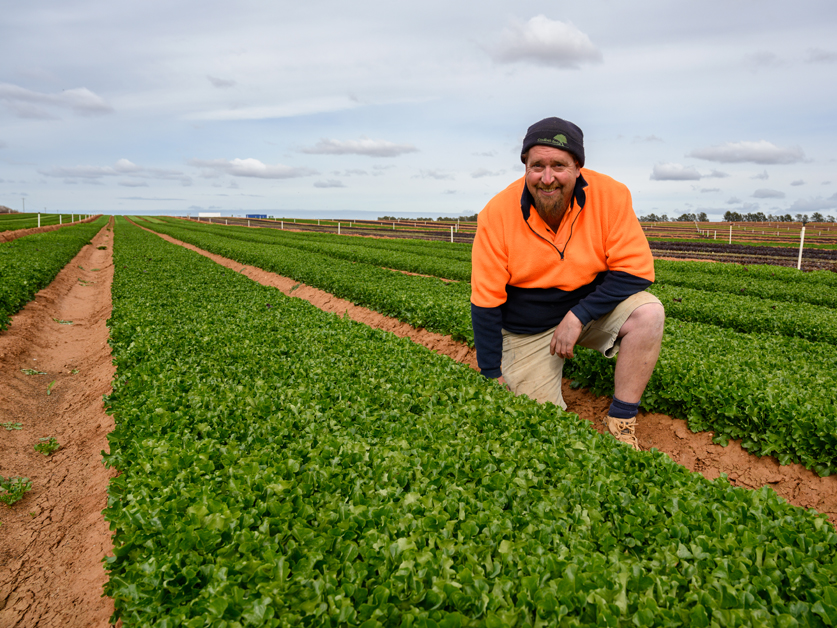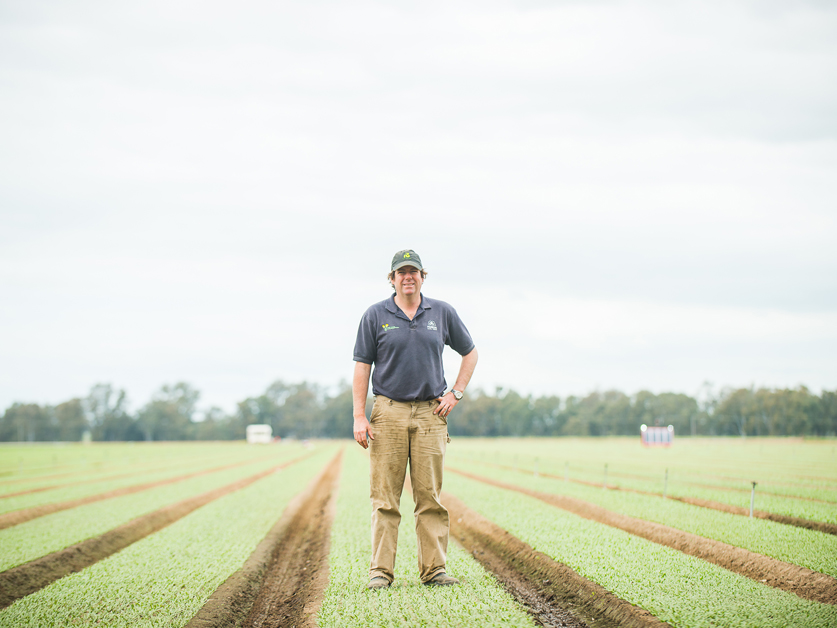
Gaining a wealth of knowledge around healthy soils
24 September 2019
Bao Duy Nguyen: Focusing on a sustainable farming future
24 September 2019Coolibah Herbs’ Wemen Farm Manager Matthew Johnson moved to Australia from England in 2007, having worked in the agricultural sector and qualifying as a chef upon leaving school. Today, Matthew can be found busily working between two leafy vegetable and culinary herb growing operations in Victoria’s north. Michelle De’Lisle reports.
Fast facts
Name: Matthew Johnson
Location: Wemen, VIC
Works: Coolibah Herbs
Grows: Leafy vegetables and culinary herbs
Matthew Johnson is a qualified chef from England; however, his preference to be outdoors rather than in the kitchen saw him swap the cutting board for the tractor to grow vegetables for others to cook.
Back in England, Matthew was involved in egg production and worked intermittently on lettuce and potato farms. In 2007, he and his wife Sarah moved to Melbourne where Matthew pursued his passion for horticulture, finding a job driving tractors for Coolibah Herbs, a large-scale family-owned leafy vegetable and culinary herb growing operation that has farms in Pearcedale in Melbourne south-east and Wemen, in north-eastern Victoria.
Eighteen months ago, Matthew advanced his career after accepting the Coolibah Herbs’ Farm Manager position at its Wemen operation located 110 kilometres south of Mildura in Victoria’s Mallee region. He oversees 700 acres of conventional irrigated ground that produces baby leaf spinach; wild rocket; lettuce; culinary herbs such as coriander, dill and parsley; Asian leafy vegetables; and salad vegetables. In addition to this, Matthew must travel 16 kilometres down the road to look after 400 acres of organic farmland that produces the same vegetables and herbs as the conventional farm, with a few seasonal variations.
Sarah takes care of the office and administration work, and the couple have three daughters: 11-year old Caitlin, nine-year old Zoe and Amelia, who is seven.
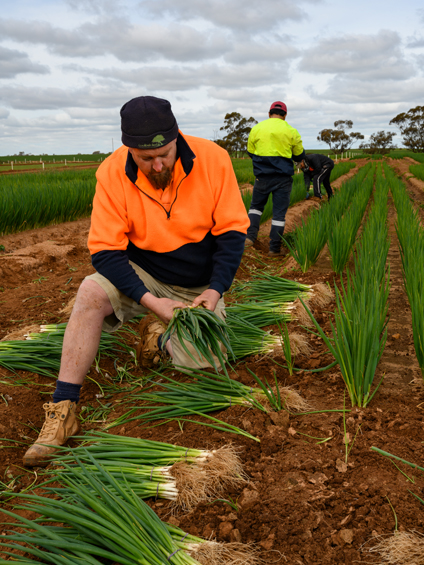
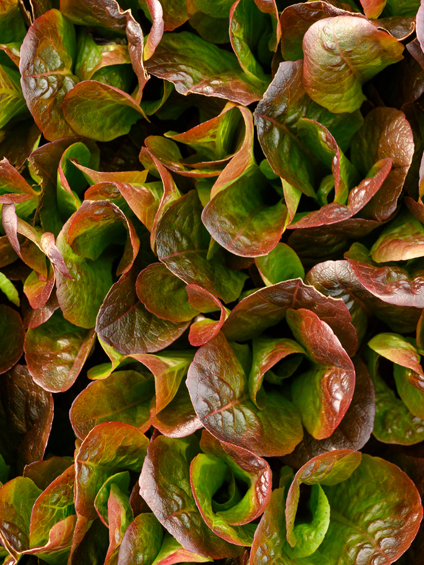
Facing Challenges
As Farm Manager, Matthew has to be highly organised. He needs to ensure planting is occurring in the right areas, that the nutrition and spray programs are all up-to-date and that all the harvesting is done in the right areas in a timely manner before produce is sent to Coolibah Herbs’ Pearcedale operation for processing.
These responsibilities do pose challenges, including finding workers to assist Matthew on the farm.
“Because we are quite far out of town – we’re half an hour from Robinvale and about an hour from Mildura – it’s very hard to get staff,” he explains.
“We keep advertising and hopefully we get the odd member come through. And when we get a good staff member, we have to look after them to try and keep hold of them.”
Meanwhile, the weather is also a challenge; particularly in summer when temperatures can soar up to 50 degrees Celsius.
“We don’t produce over the hot summer months – that goes back down to our farm in Melbourne. During that time, we get everywhere green manure cropped and work the paddocks to get them ready for the following season,” Matthew says.
“It’s good winter growing weather.”
“It's vital to do this – you don't want to keep punishing the ground, you've got to respect it and lessen the use of high-level insecticides, pesticides and fungicides, and try to use the user-friendly approach rather than the hard-core chemicals,"
Gaining Knowledge
While lettuce production in England is similar to that in Australia, Matthew has had to learn about irrigation techniques, particularly since relocating to the Mallee where conditions are dry, even in winter.
“Back in England, you didn’t have to irrigate for a start. Mother Nature always did that for you. Irrigating is a big job over here in itself,” Matthew says.
Matthew learnt about different growing practices while based in the Melbourne growing operation for the first decade, while there is regular help at hand.
“We have an agronomist who comes through once a week and we also have our agronomist from Pearcedale who comes to visit probably every 2-3 weeks,” he says.
“I’ve read a lot and learnt, and there’s always the phone, internet for anything else that I need to find out.
“The neighbours and surrounds have been very helpful, making me feel welcome up in the area – it was a big move for myself, my wife and three kids to move from down in Pearcedale to the Mallee.”
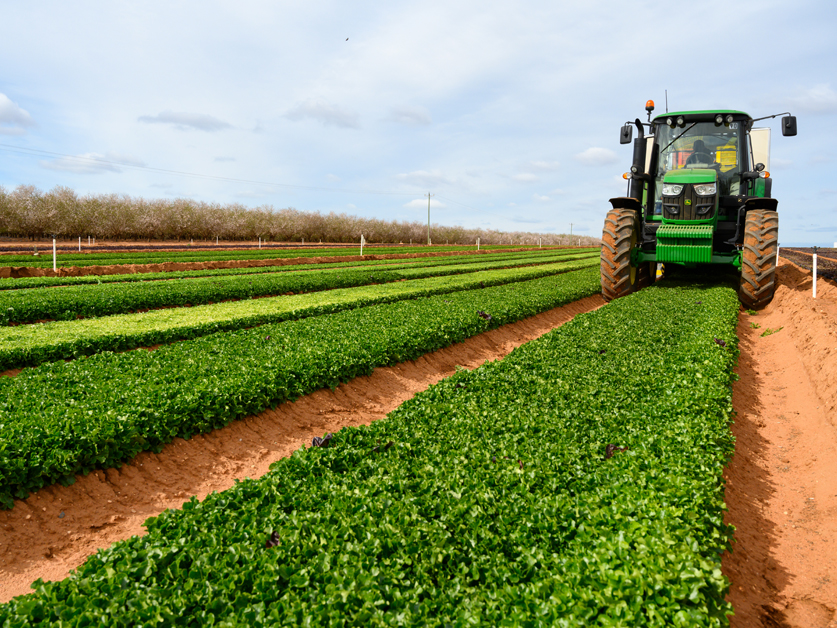
A greener approach
To maintain the farm’s ongoing sustainability, Matthew uses beneficial insects, as well as Trichoderma (fungi) to keep those beneficial populations steady.
“It’s vital to do this – you don’t want to keep punishing the ground, you’ve got to respect it and lessen the use of high-level insecticides, pesticides and fungicides, and try to use the user-friendly approach rather than the hard-core chemicals,” he says.
“We have to keep the R&D ongoing to develop better ways of farming without aggressive chemical usage. We’re adopting R&D as best as we can up here in the harsh climate. A lot of it is going on down in Melbourne at the main farm, and then we do different trials, as well as bring in new equipment that’s not as damaging to the soils. There’s also increasing green manure cropping for different crops.”
Matthew says growing produce in a more organic way is a future focus for Coolibah Herbs. Currently, the Wemen operation has been growing its organic produce for 6-7 years and this will only continue to grow.
In the meantime, Matthew is happy to remain in the paddock rather than working in the kitchen.
“I enjoy growing a good crop that I’d be willing to eat, so I’m sure everyone else would be willing to eat too. And then to send it down for production and see it on the shelves in the shops is rewarding. It means that people are buying the produce and eating it, which is a good thing.”
This grower profile first appeared in the leading magazine for the Australian vegetable industry, Vegetables Australia. If you’d like to subscribe to receive a new edition of Vegetables Australia in your mailbox every two months, use our online subscription form!
Photography credit: Excitations

